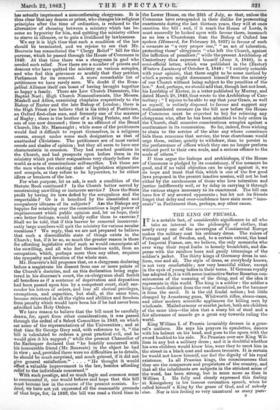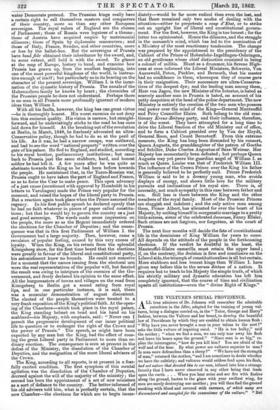THE KING OF PRUSSIA.
TT is a notable fact, of considerable significance to all who I take an interest in the philosophy of clothes, that nearly every one of the sovereigns of Continental iurope makes the military coat his ordinary dress. The rulers of Portugal and of Sweden, and, to a certain extent, the head of Imperial France, are, we believe, the only monarchs who ever wrap their royal limbs in homely broadcloth, and dis- pense with the rainbow hues and gaudy trimmings of the soldier's jacket. The thirty kings of german), dress in uni- form, one and' all. The style of dress, as everybody knows, is not very comfortable; very beautiful either, except in the eyes of young ladis in their teens. If German royalty has adopted it, it is with some instinctive Sartor Resartus con- sciousness of the meaning of the thing, and of the idea it represents in this world. The king is a soldier : the soldier a king—both distinct from the rest of mankind, as the hammer is from the anvil. It is the old feudal notion; but little changed by Armstrong guns, Whitworth rifles, steam-rams, and other modern scientific appliances for killing men by wholesale. Mailed armour or scarlet jacket, both are children of the same idea—the idea that a sharp bit of steel and a fair allowance of muscle go a great way towards ruling the world.
King William I. of Prussia invariably dresses in a gene- ral's uniform. He says his prayers in epaulettes, dances with his helmet on his head, and goes to the opera with the sword buckled to his side. No Prussian ever saw King Wil- liam in any but a military dress ; and it is doubtful whether his own children would know him, were they to meet him in the street in a black coat and nankeen trousers. It is certain he would not know himself, nor feel the dignity of his royal existence. In all Prussian kings, the consciousness that they are the conquerors and proprietors of the country, and that all the inhabitants are subjects in the strictest sense of the word, has been strong, but in none more so than in William I. He fully and clearly expressed this feeling at Konigsberg in his famous coronation speech, when he called himself a King by the grace of God, and of nobody else. Nor is this feeling so very unnatural as many pure- water Democrats pretend. The Prussian kings really have a certain right to call themselves masters and conquerors of their country, more so than any other European sovereigns. The royal rulers of England are the chosen of Parliament; those of Russia were legatees of a throne ; those of Austria have acquired empire by matrimonial alliances ; those of Spain by diplomatic manoeuvres; and those of Italy, France, Sweden, and other countries, more or less by the ballot-box. But the sovereigns of Prussia have bond fide obtained their inheritance by the sword, and, to some extent, still hold it with the sword. To glance at the map of Europe, history in hand, and examine how Prussia has grown up, from the smallest beginning, into one of the most powerful kingdoms of the world, is instruc- tive enough of itself ; but particularly so in its bearing on the character of the present sovereign. William I. is the incar- nation of the dynastic history of Prussia. The annals of the Hohenzollern family he knows by heart ; the chronicles of the Prussian people he does not understand. Perhaps there is no man in all Prussia more profoundly ignorant of modern ideas than William I.
With all his faults, however, the king has one great virtue —he is thoroughly honest. His worst enemies do not deny him this eminent quality. His vision is narrow, but straight- forward, and he undeviatingly sticks to the road he has once laid down for himself. At the breaking out of the revolution at Berlin, in March, 1848, he fearlessly advocated an ultra- Conservative policy, though he had to do so at the peril of his life. As it was, he had a narrow escape, was outlawed, and had to see the word " national property" written over the gate of his palace. He fled to England, and studied, according to his royal brother, parliamentary institutions ; but came back to Prussiajust the same stubborn, hard, and honest soldier he had left it. A few years after he was quite as obstinate towards the King as he had been before towards the people. He maintained that, in the Turco-Russian war, Prussia ought to have taken the part of England and France, so as to force the Czar to make peace. This open advocacy of a just cause (mentioned with approval by Humboldt in his letters to Varnhagen) made the Prince very popular for the moment, and raised the hopes of the liberal party in Prussia. But a reaction again took place when the Prince assumed the regency. In his first public speeeh he declared openly that he had no faith whatever in pieces of paper called constitu- tions; but that he would try to govern the country as a just and good sovereign. The words made some impression on the people, the more so as the Regent immediately ordered the elections for the Chamber of Deputies ; and the conse- quence was that in this first Parliament of William I. the Government had a large majority. Then, however, came a revulsion of popular feeling, caused by this very excess of loyalty. When the King, on his return from the splendid Konigsberg show, for the first time heard that the elections were greatly in favour of the liberal and constitutional party, his astonishment knew no bounds. He could not conceive for a moment that the names issuing from the electoral urn were the real representatives of the popular will, but fancied the result was owing to intrigues of the enemies of the Go- vernment, and freely declared his opinion to the same effect. All the burgomasters of towns and villages on the road from Konigsberg to Berlin got a sound rating from royal lips, and in one particular instance, it is said, there was a muscular demonstration of august discontent. The elected of the people themselves were treated to a very frank exposition of the King's political faith. At the open- ing of the Chambers—which took place in the royal palace, the King standing helmet on head and his hand on his scabbard—his Majesty, with emphasis, said : " Never can I permit the progressive development of our inner political life to question or to endanger the right of the Crown and the power of Prussia." The speech, as might have been expected by any man but the King, had the effect of rous- ing the great Liberal party in Parliament to more than or- dinary exertion. The consequence is seen at present in the defeat of the Ministry, the dissolution of the Chamber of Deputies, and the resignation of the more liberal advisers of the Crown.
The King, according to all reports, is at present in a fear- fully excited condition. The first symptom of this mental agitation was the dissolution of the Chamber of Deputies, decreed against the will of the majority of the ministry; the second has been the appointment of a set of new ministers as a sort of defiance to the country. The better informed of his old advisers told him, what is perfectly certain, that the new Chamber—the elections for which are to begin imme- diately—would be far more radical than even the last, and that there remained only two modes of dealing with the situation—either to perpetrate a coup d'Etat, or to strike out an upright line of liberal and constitutional govern- ment. For the first, however, the King is too honest ; for the latter too opinionated. Hence the dilemma, and the struggle in the monarch's mind, which has led to die nomination of a Ministry of the most reactionary tendencies. The change was .prepared by the appointment to the presidency of the Cabinet of the Prince of Hohenlohe-Ingelfingen-Oehringen, an old gentleman whose chief distinction consisted in being a colonel of militia. Blunt as a drummer, his Serene High- ness at once informed the Liberal Ministers, Schwerin, Von Auerswald, Paton, Piickler, and Bermuth, that his master had no confidence in them, whereupon they of course gave in their resignation. Their successors are ultra-Conserva- tives of the deepest dye; and the leading man among them, Herr von Jagou, the new Minister of the Interior, is hated as scarcely another man in Prussia is hated, on account of his petty despotism at the head of the police department. The new Ministry is entirely the creation of the two men who possess real power over the mind of the King—General Manteuffel and Privy Councillor Illaire. Both belong to the old reac- tionary Kreuz-Zeitung party, and their influence, therefore, is of the worst. They have attempted for a long time to drive the Liberal fraction of the old Ministry out of office, and to form a Cabinet presided over by Von der Heydt, General Roon' and Count Bernstorff. From this extreme measure, the King has long been dissuaded by his consort, Queen Augusta, the granddaughter of the patron of Goethe and Schiller, Duke Charles Augustus of Saxe-Weimar. Her Majesty has momentarily been defeated ; but perhaps Queen Augusta may yet prove the guardian angel of William I. as much as Queen Louise was that of Frederick William III. The influence of the Crown Prince over the King his father is generally believed to be perfectly null. Prince Frederick William is said to be a dreamy young man, who avoids displays of energy, and shows little love for the military pursuits and inclinations of his royal sire. There is, of necessity, not much sympathy in this case between father and son. Still leas is there between the King and the other members of the royal family. Most of the Prussian Princes are sluggish and indolent ; and the only active man among them, Prince Albert, has alienated for ever the heart of his Majesty, by uniting himself in morganatic marriage to a pretty little actress, sister of the celebrated danseuse, Fanny Ellsler. Sach crimes are not forgiven, nor forgotten, at the court of Prussia.
The next four months will decide the fate of constitutional life in the dominions of King William for years to come. All depends on the attitude of the people in the forthcoming elections. If the verdict be doubtful in the least, the Manteuffel-Illaire camarilla, must retain the upper hand ; if, on the contrary, the decision is firm and conclusive on the Liberal side, the triumph of constitutionalism is all but certain. More stubborn and less honest kings than William I. have given way before this to the verutn dictum, of a nation. It requires but to teach to his Majesty the simple truth, of which his strictly military and dynastic education has left him completely ignorant, that the course of time and civilization upsets all institutions—even the " divine Right of Kings."































 Previous page
Previous page